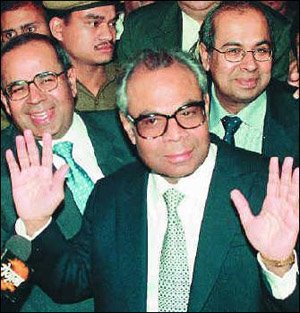Anil Ambani gets go ahead for DTH
welcome aboard amit's official Blog
Nothing can beat the relaxed hours one spends before a television
after an office/school rigour. Be it a bloody battle between Brazil
and Argentina (people call it football!!) or be it the Devil's
Advocate with Karan Thappar at his articulate best, everybody enjoys
watching TV. However here and there, a middle class wife will fight
with her husband around 28th or 29th of every month to cancel the
cable TV subscription pointing to the ever-burgeoning cable cost and
the dip in the quality due to illegal usage. Well here is an answer
to all the problems abovementioned- DTH expanded to Direct To Home.
When DTH was first introduced in the late nineties by private
players, the Government was not in all favours citing security
problems. However the idea was revamped in 2001 and Rupert Murdoch
owned iSkyb launched he first DTH service and the government too
forayed with the DD direct plus. Now the market has become
competitive with the entry of R-ADA into the broadcasting setup.
If one has followed the recent activities of Anil Ambani he/she
wouldn't be surprised with this move. Anil has began to expand his
grip over the Indian market by including diversity in his ambit and
it is evident from his investment in joint ventures with PVR and
Adlabs in building multiplexes, in FM radio channels and in
producing films in synergy with high network bollywood people.
A smart businessman that Anil is, has been fast in realizing the
growth potentials one has in the broadcasting market.
PricewaterhouseCoop er has predicted a manifold increase in the
number of DTH subscribers. From a mealy 3.25 millions to 15 millions
in two years is a real growth if PricewatrhouseCoope r is to be
trusted. Further more Anil could also make his viewers subscribe to
his multiplex shows or listen to his FM if he can gain a strong hand
in the DTH market.
This R-ADA foray into DTH market may make profound implications on
1) The market cap of Reliance
2) The competitors' interest and
3) The public
Despite the split of the Reliance Empire, Reliance stocks still soar
high and Anil's strategic moves have been instrumental in
maintaining the momentum. The latest arrow from the Ambani quiver is
Reliance Blue Magic the subsidiary, which will deal with the DTH
market. With only four major private players viz IskyB of News Corp,
Dish TV of Zee groups, Sky TV- an 80:20 venture of Tatas and Star TV
and the South Indian major SUN Network, much is at the offering and
Anil has displayed immaculate entrepreneurial skills in setting up
this DTH service providing venture. With the Midas touch that he
has, no doubt Reliance Blue Magic will hit the target and bring in
more revenue to Reliance Energy, the parent organization of Anil
Dhirubai Ambani enterprise.
The Cable TV operators' honeymoon is going to end soon with CAS and
DTH's taking over. Zee is offering its DTH services at Rs 200/- and
the package includes eventy five channels. Star offers similar
number of channels for Rs 180/-. These charges do not include the
setting-up charges and with the entry of RBM will only make the
setting more interesting and it will be a good spectacle to watch
how these competitors battle it out.
With all these private parties engaging in a gripping combat, the
viewers will be promised the best of the quality, making TV watching
a pleasant experience. The viewers now have a wide choice of service
providers to choose from, with the package from each being more
attractive than the competitor's in one way or the other. Gone are
the days of illegal usage and cable operators' escapade from higher
entertainment taxes.
Having done all the formalities and with the LoI of the government
in its kitty, RBM is all set to make its presence felt in the DTH
services. Anil's strategy to win the battle will also be a thing to
watch out and having seen him all these days I am sure it will be
unique and successful as usual.
H k







